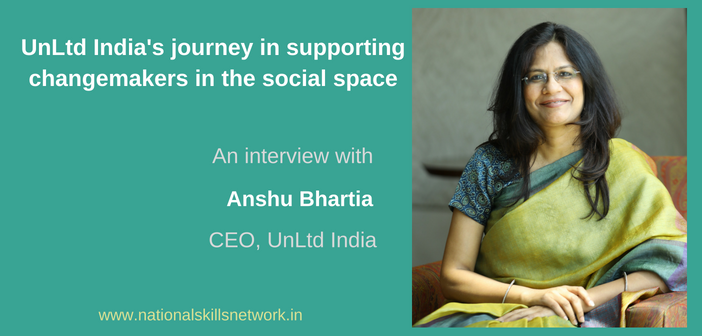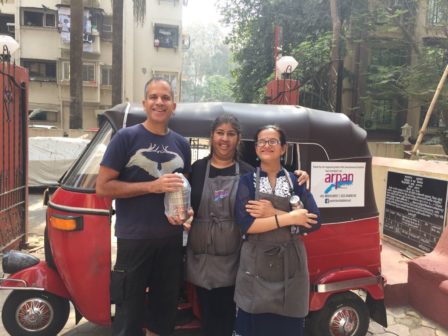Social entrepreneurship is slowly gaining popularity among aspiring entrepreneurs in India. UnLtd India supports social entrepreneurs, who are passionately pursuing their dreams about making India a better country by solving many socioeconomic issues. Through this interview, Anshu Bhartia, CEO, UnLtd India, narrates the Skill Story of their journey so far and how UnLtd India is actively engaged in building an ecosystem that encourages and empowers the changemakers.
Q. How is UnLtd India creating awareness and extending support to social entrepreneurs?
A: India is booming, yet enormous social problems remain. In our 11 year journey, we have met, known and heard of a significant number of individuals across the country who have demonstrated their ability and willingness to address some of the country’s growing socio-economic issues through innovation and enterprise. We deem these individuals as social entrepreneurs. At the early stages, most of these individuals face significant barriers in the form of limited access to capital, little or no access to technical support, and a lack of access to relevant networks. These barriers limit the number of passionate and socially-driven individuals from pursuing ideas that could significantly impact our society.
UnLtd India was one of India’s first launchpads for social entrepreneurs. We have been promoting social entrepreneurship by addressing the critical gaps that early stage social entrepreneurs face while building an ecosystem for social entrepreneurship to thrive in. Our work enables these individuals to develop as leaders, and their emerging ideas to grow into high impact and sustainable organisations.
Our Incubation Program is designed to be entrepreneur-centric, model inclusive, and sector agnostic. To spread awareness, we conduct workshops in colleges and other spaces promoting social entrepreneurship, and media presence through blogs and stories of successful entrepreneurs.

Q. Have you worked with social entrepreneurs in the skilling sector? How do you think this is addressing the gap that India is facing with regards to its skilled personnel?
A: The skilling space has recently witnessed a boom of players. It is said that there are over 800 not-for-profits working towards skill development in the country. National Skills Development Corporation (NSDC) has introduced a number of schemes that has encouraged NGOs to enter this space. However, parallel to the growth of solutions in this space, a large number of not-for-profits are becoming back offices to the corporate sector, who are looking for job-ready skilled individuals.
At UnLtd India, we have worked with and continue to work with early-stage social entrepreneurs who have innovative ideas to solve the skills gap in India. For example: Chris Turillo started Medha Foundation that provides 21st-century skills, communication and computer training, career guidance, mentorship and on-the-job work experience and placement support to students with minimal opportunities across Uttar Pradesh. Enabling internships and supporting students through constant career guidance and hand-holding, they are able to overcome their fears and seamlessly integrate into jobs that they are passionate about. Similarly, we work with Priya from Antarang Foundation that works with low-income youth to build their capacity to discover and pursue a career built on their passion, interests and skills.
We have had the privilege of working with social entrepreneurs who are providing skill training to persons with disabilities. Gopal from Youth for Jobs and Sushama who runs Yash Charitable Trust are dedicated towards the empowerment, employment, and inclusion of young adults with disabilities. While YCT works with individuals with Autism, Down syndrome etc. Youth for Jobs is working with people with physical disabilities.
These skilling organizations through their innovative approach are addressing the gaps and critiques of earlier initiatives by including career counselling pre and post placement in their scope of services.
But we need to be asking if training is enough. Does the acceptability, infrastructure, awareness exist towards such efforts of including persons with disabilities? When can organisations working towards such inclusion truly say that they have scaled?
Q. There are a number of social entrepreneurs who work towards solving similar issues. How can they deepen their impact and grow their reach collectively?
A: We believe that every idea works. Our social entrepreneurs come from different geographies and view problem statements from their own context. They have immense local expertise and have built a connect with their beneficiaries over a period of time. They deep dive into understanding the problem on-ground and design solutions to optimise their outcomes.
We have 17 organisations under our skilling portfolio but there are so many more beyond that. It is imperative to bring together the expertise of all these social entrepreneurs in order to build long-term sustainable solutions. Thus, building cross-sector collaborations is the first step towards coming together to collectively find and scale sustainable solutions.
At UnLtd India, we are constantly building platforms where our social entrepreneurs who are addressing the same/similar social concern can come together, discuss the challenges and look for synergies. For me, new ideas are great but a constant reinvention of the wheel needs to take place. We need to be looking at how innovative ideas within a sector can be customised to address a larger socio-economic issue. Once the success of a model is proven, how can the country come together to foster collaborations?
Q. What has been UnLtd India’s impact so far and how would you describe the journey in terms of successful incubation, scaling of social enterprises
 A: UnLtd India has been encouraging social entrepreneurship over the last 10 years. During this time, we have incubated over 190+ social entrepreneurs who have impacted over 2.5 million lives and facilitated over 149,400 jobs/livelihoods. Our social entrepreneurs service geographies across the length and breadth of the country. 19% of them address social issues within their communities. The commitment, passion, and dedication with which these social entrepreneurs work is commendable. 39% of our social entrepreneurs have reapplied to our Incubation Program. The journey so far has been fulfilling and fruitful. There is still a long way ahead in building more pathways for social entrepreneurs to create greater impact.
A: UnLtd India has been encouraging social entrepreneurship over the last 10 years. During this time, we have incubated over 190+ social entrepreneurs who have impacted over 2.5 million lives and facilitated over 149,400 jobs/livelihoods. Our social entrepreneurs service geographies across the length and breadth of the country. 19% of them address social issues within their communities. The commitment, passion, and dedication with which these social entrepreneurs work is commendable. 39% of our social entrepreneurs have reapplied to our Incubation Program. The journey so far has been fulfilling and fruitful. There is still a long way ahead in building more pathways for social entrepreneurs to create greater impact.
Q. What do you look for when shortlisting entrepreneurs for your Incubation support?
A: We at UnLtd India look for social intent at the core of the person’s idea. We look for 4 key ‘I’s’ while selecting individuals for our Incubation Program. These are:
Individual: We look for individuals who exhibit entrepreneurial characteristics, an unwavering commitment to social change and the ability to garner resources to support their work.
Idea: We look for ideas that are focused on solutions to fit specific social problems, address an unmet need or under-served sections of society.
Impact: We look for ideas that have the potential to create long-term and sustained impact within their communities, at a city/state level, and at scale.
Incubation: We look for individuals open to feedback and can gain from our non-financial support.
Q. Lastly, please share your long term plans about impacting the evolving skill development and vocational education system in India
A: As an incubator, we are committed to encouraging and growing new ideas and solutions in both skilling and entrepreneurship (every entrepreneur further increases employment opportunities). We will continue to grow this portfolio and build on our Learning Journeys platform where we will encourage discussion, dialogue for best practice sharing, leveraging strengths and building partnerships for scale and deeper impact.













Comments 1